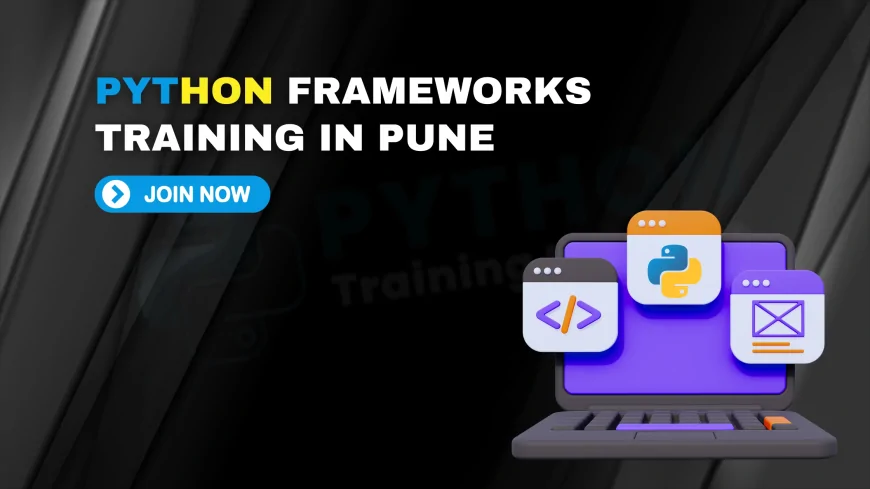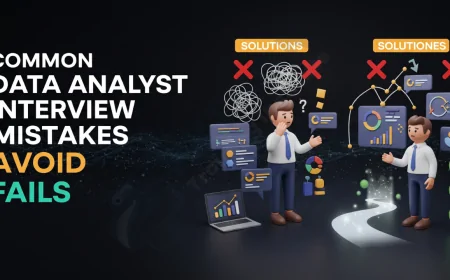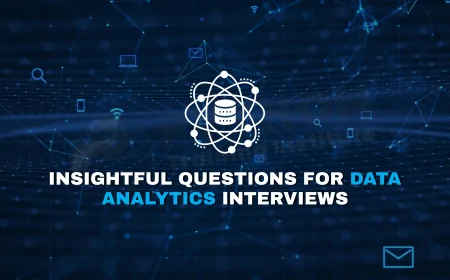Python Frameworks Training Courses in Pune | Top Institutes for Django, Flask & Python Frameworks Training Pune
Explore the best Python frameworks training courses in Pune including Django, Flask, and FastAPI. Get hands-on project-based learning, expert mentorship, full-stack development skills, and job placement assistance from leading institutes.

Table of Contents
- Introduction
- Why Learn Frameworks?
- Popular Frameworks Span
- Top Pune Providers
- Course Formats & Curriculum
- Tools & Technologies Covered
- Mentorship & Placement
- Career Outcomes & Salary
- How to Pick a Course
- FAQs
- Conclusion
Introduction
In Pune’s dynamic tech environment, mastering Python frameworks like Django, Flask, and FastAPI is essential for developers aiming at web, API, and full-stack roles. Framework training often spans from 30–200+ hours, includes project-based learning, and offers placement support.
Why Learn Frameworks?
- Accelerate development: Pre-built modules for authentication, database, routing, templates
- Industry demand: Nearly all backend jobs list Django or Flask in the requirements
- Full-stack pathways: Combining with JS/HTML/CSS opens door to strong full-stack roles
- Microservices-ready: FastAPI enables async, high-performance API development
Popular Frameworks Covered
- Django: High-level MVC framework—ORM, admin, templating, security :contentReference[oaicite:7]{index=7}
- Flask: Lightweight micro-framework ideal for REST and prototype APIs
- FastAPI: Modern, async-first, auto-doc generation, used in production
- Full-stack: Combos of Django + React/Vue or Flask + JS libraries offer versatility
Top Pune Providers
Python frameworks like Django, Flask, FastAPI, and Pyramid are essential for backend development, web apps, and RESTful APIs. Several top-rated training institutes in Pune offer specialized courses on these frameworks with hands-on experience, live projects, and placement support. Here are some of the best providers:
Webasha Technologies
- Python Full-Stack Course covering Django, Flask, and REST API
- Hands-on project work + GitHub deployment
- 100% placement assistance with resume prep & mock interviews
These courses are ideal for web developers, backend engineers, and job seekers wanting to build real-world apps and secure a Python developer role. Make sure to choose a provider that aligns with your goals, project experience level, and preferred learning format (online/offline).
Course Formats & Curriculum
The Python frameworks training courses in Pune are designed to suit different types of learners, from beginners to working professionals. Top institutes like Webasha, 3RI Technologies, Ethans Tech, and Apponix offer flexible formats and a comprehensive, industry-aligned curriculum. Here's what you can expect:
Course Formats
- Classroom Training: In-person sessions at Pune centers with hands-on lab access and direct mentorship.
- Live Online Training: Real-time interactive classes with instructors and access to LMS for recorded sessions.
- Hybrid Mode: Combines the flexibility of online learning with periodic offline workshops or project reviews.
- Weekend Batches: Ideal for working professionals—classes on Saturdays and Sundays for 6–10 weekends.
- Fast-Track Courses: Intensive format for career switchers or urgent upskilling—4–6 weeks of daily sessions.
Curriculum Highlights
- Core Python Programming: Data types, loops, functions, OOPs, file handling
- Frameworks: In-depth modules on Django, Flask, FastAPI, and optional Flask-RESTful or Pyramid
- API Development: Creating and consuming REST APIs, JSON, Postman testing, and authentication
- Web Technologies: HTML, CSS, Bootstrap basics, integrating templates in Django/Flask
- Database Integration: SQLite, PostgreSQL, or MySQL connections with ORM support
- Project Work: Mini and major projects hosted on GitHub or deployed to Heroku/AWS
- DevOps Basics (Optional): CI/CD, Docker, Git version control for Python deployments
All major Python framework courses offered in Pune ensure job-readiness by balancing theory, real-time coding, and industry use cases. Most also include soft skills, interview preparation, and certification support.
Tools & Technologies Covered
- ORMs: Django ORM, SQLAlchemy
- Template engines: Django templates, Jinja2
- API frameworks: Flask-RESTful, DRF, FastAPI
- Frontend integration: Bootstrap, JavaScript, React basics
- Deployment: Gunicorn, Nginx, Docker, Heroku, AWS
- Database: PostgreSQL, MySQL
- Version control & CI/CD: Git, GitHub, GitLab pipelines
Mentorship & Placement
One of the most critical components of a successful Python training program is the quality of mentorship and post-training placement assistance. Leading Python institutes in Pune like Webasha Technologies, 3RI Technologies, Ethans Tech, and Apponix Academy go beyond classroom teaching to offer personalized guidance and career-building resources. Here's how they stand out:
1. Personalized Mentorship
- 1-on-1 Guidance: Dedicated mentorship sessions to resolve coding doubts and track learning progress.
- Project Reviews: Experts provide real-time feedback on project submissions and GitHub repositories.
- Career Mapping: Mentors help learners choose the right specialization—web, automation, data, or backend.
2. Industry-Relevant Projects
- Capstone and mini-projects in Django, Flask, or FastAPI for real-world experience.
- Projects are structured to align with common job roles like Python Developer, Web Developer, and Backend Engineer.
3. Strong Placement Support
- Mock Interviews: Simulated technical and HR rounds to prepare students for actual job interviews.
- Resume Building: Industry-ready resumes with a focus on skills, projects, and GitHub activity.
- Interview Calls: Institutes like Webasha and Apponix offer 5–10 guaranteed interview opportunities.
- Corporate Tie-Ups: Hiring partnerships with tech companies and MNCs across Pune and India.
Success Metrics
- 70%+ placement rate for project-completing candidates (based on institute claims)
- Common job titles: Python Developer, Automation Engineer, Backend Developer, Django Intern
- Average fresher salary: ₹3.2 – ₹5.5 LPA depending on role and performance
Institutes that combine practical mentorship with a focused placement cell ensure learners are not only skilled but also job-ready. Be sure to inquire about mentorship frequency, real alumni success stories, and recruiter engagement when choosing your training provider.
Career Outcomes & Salary
- Django/Flask dev: ₹4–8 LPA starting salary in Pune
- Full-stack roles: ₹8–15 LPA with frontend ability
- Backend API specialist: ₹6–12 LPA in FastAPI microservices
- Freelance & startup projects: High demand for full-stack developers
How to Pick a Course
Choosing the right Python course can be the difference between simply learning syntax and actually launching a successful tech career. Pune offers a variety of Python training options, so it’s important to evaluate your choices based on these key factors:
1. Define Your Career Goal
- Beginners: Opt for a full-stack Python course with Django/Flask if you're just starting out.
- Career Switchers: Look for job-oriented programs with placement assurance and real-world projects.
- Working Professionals: Go for weekend or evening classes with flexible schedules and advanced topics.
2. Evaluate the Curriculum
- Ensure it covers core Python, object-oriented programming, web frameworks (Django, Flask), API development, and database integration.
- Hands-on capstone projects, live assignments, and GitHub portfolio creation are must-haves.
3. Check Trainer Credentials
- Experienced trainers from MNC backgrounds or those active in tech consulting are highly preferred.
- Institutes like Webasha, 3RI, and Ethans Tech boast trainers with 8+ years of real-world experience.
4. Confirm Placement Support
- Look for programs offering mock interviews, resume writing, LinkedIn optimization, and direct recruiter connections.
- Institutes with proven placement records (like Webasha and Apponix) provide strong career outcomes.
5. Choose the Right Format
- Options include weekday, weekend, fast-track, and hybrid (online + offline) classes.
- Live online classes are ideal for remote learners, while classroom learning suits local students better.
6. Compare Fees & ROI
- While average course fees range from ₹15,000–₹40,000, ensure the value includes certifications, lifetime LMS access, and placement services.
- Check installment plans, refund policies, and demo sessions before enrolling.
Picking the right Python course in Pune requires a clear understanding of your goals, learning style, and job aspirations. Always attend demo classes, review the curriculum in detail, and compare at least 3–5 institutes before making a final decision.
FAQs
1. Is Django better than Flask for beginners?
Django is feature-rich and structured; Flask is lightweight and flexible—Flask is easier for initial learning, Django helps with full-app patterns.
2. Should I learn Flask before Django?
Not mandatory—but learning Flask helps you understand routing and templates, which eases learning Django :contentReference[oaicite:16]{index=16}.
3. What is FastAPI?
FastAPI is an async web framework for building APIs, used today for high-performance microservices.
4. How long are framework courses?
Anywhere from 30 hrs short bootcamps to 200 hrs full-stack tracks over 3–6 months.
5. Do I get placement help?
Yes—many institutes offer placement services, interview prep, and portfolio assessments.
6. Can I attend online?
Absolutely—most providers have live online options with recordings.
7. What projects do I build?
Examples include blog apps, REST APIs, admin dashboards, and deployment pipelines.
8. Do these courses include frontend?
Full-stack courses include HTML/CSS/JS/React basics; backend-only focus may skip frontend.
9. Are vendors well-regarded?
ITView, 3RI, Apponix, and TechnoBridge have strong local reputations and corporate linkages.
10. What’s the average cost?
Framework training varies ₹15k–70k depending on depth and placement support.
11. Do I need prior Python?
Yes—basics of Python syntax, OOP, and standard libraries are prerequisites.
12. How small are batches?
Good courses keep batches between 15–25 for effective learning.
13. How to verify claims?
Ask institutes for alumni portfolio references, GitHub links, or job call records.
14. Can I freelance afterward?
Yes—knowledge of frameworks greatly enhances freelance opportunities and product development.
15. Do institutes teach Docker?
Yes—tools like Docker, Gunicorn, Nginx, and Heroku/AWS are often included.
16. How does API development differ?
API training emphasizes async calls, JSON, request-response, and documentation using FastAPI or DRF.
17. Is placement 100% real?
Placement support is real; however, job offers depend on your performance and interview results.
18. Can I switch between frameworks?
Yes—learning core concepts in one framework helps transition to others easily.
19. Does the course offer certificates?
Yes—completion certificates plus PCEP/PCAP or institute-specific badges may be included.
20. What’s next after framework training?
Enhance your skills in data science, DevOps, microservices, or advanced frontend frameworks.
Conclusion
Python frameworks training in Pune offers a compelling path for developers wanting to build full-stack or backend applications. Programs focusing on Django, Flask, and FastAPI give both structure and flexibility through real projects, mentorship, and placement support. Choose based on your target role—web, API, or full-stack—and invest in institutes known for practical outcomes and industry linkage. With commitment and real-world learning, you can launch a thriving developer career in Pune’s vibrant tech ecosystem.
What's Your Reaction?
 Like
0
Like
0
 Dislike
0
Dislike
0
 Love
0
Love
0
 Funny
0
Funny
0
 Angry
0
Angry
0
 Sad
0
Sad
0
 Wow
0
Wow
0
















